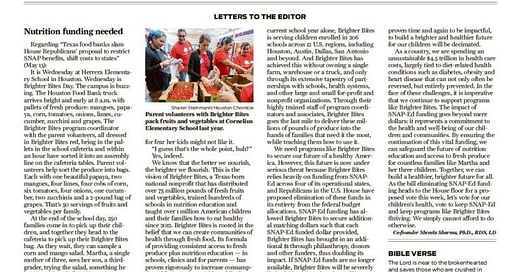Years back I served as executive director of the Houston-based nonprofit Brighter Bites, a public health program masquerading as food distribution. National in scope but locally-focused, Brighter Bites masterfully leveraged the infrastructure and incentives of a network of partners to create communities of health through fresh food (and still does, operating in 12 cities across 8 states).
I learned at the foot of co-founder Shreela Sharma about policies of addition (vs restriction), and about raising one's voice to shape the world we want (vs what we're confronted with). Now is one of those times:
She recently wrote this op-ed for the Houston Chronicle; for anyone looking for examples of how public/private partnerships can solve intractable issues, I believe you'll find it compelling, and timely, what with key funding provision SNAP-Ed (whose stated goal is “to improve the likelihood that (SNAP) participants will make healthy food choices”) set to be zeroed out in the reconciliation bill.
It’s hard to square the idea of pursuing a healthier America while at the same time eliminating a program that is locally adaptable; demonstrably improves healthy behaviors; and more broadly brings about policy, systems, and environmental changes to the benefit of entire communities.
At best it’s a misunderstanding. At worst, it’s calculated indifference disguised as reform. Either way it’s an insult to people serving at the point-of-impact, and I can only hope - optimistically, maybe naively - that supportive voices will prevail in the program’s salvation.
If you’d like to take action in support of SNAP-Ed and the programs it powers, take a look at The Food Trust’s excellent toolkit (Save SNAP-Ed) and make your voice heard.





